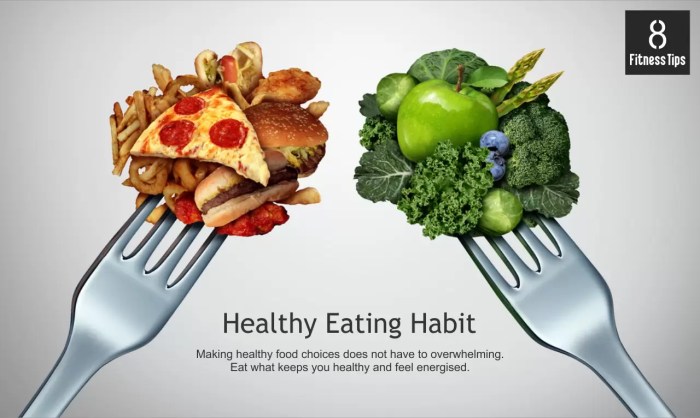Healthy Eating Habits pave the way to a vibrant lifestyle, boosting overall well-being and vitality. Get ready to dive into a flavorful journey filled with nutritious insights and delicious tips!
From the importance of balanced meals to practical strategies for meal planning, this topic covers all the essentials for embracing a healthier way of eating.
Benefits of Healthy Eating Habits

Maintaining healthy eating habits is crucial for overall well-being. It not only affects physical health but also has a significant impact on mental health and energy levels.
Physical Health
Healthy eating habits can lead to a stronger immune system, reduced risk of chronic diseases such as heart disease and diabetes, and better weight management. By consuming a balanced diet rich in fruits, vegetables, whole grains, and lean proteins, individuals can ensure that their bodies receive the necessary nutrients to function optimally.
Mental Health
Eating nutritious foods can also have a positive effect on mental health. Studies have shown that a diet high in processed foods and sugars can contribute to mental health issues such as depression and anxiety. By fueling the body with nutrient-dense foods like leafy greens, nuts, and fatty fish, individuals can support brain health and improve their overall mood.
Energy Levels
Healthy eating habits play a crucial role in sustaining energy levels throughout the day. Foods rich in complex carbohydrates, such as whole grains and legumes, provide a steady source of energy, while staying hydrated and consuming adequate amounts of protein can also help prevent fatigue. By prioritizing nutrient-dense foods and avoiding sugary snacks, individuals can maintain consistent energy levels and avoid crashes.
Components of a Healthy Diet
Eating right ain’t just about avoiding junk food. It’s all about getting the right mix of nutrients to keep your body running like a well-oiled machine.
Key Components of a Balanced and Nutritious Diet
When it comes to chowing down, variety is key. Here are the main players that should be on your plate:
- Fruits: Packed with essential vitamins, minerals, and fiber, fruits are nature’s candy that keeps you healthy and energized.
- Vegetables: Don’t skimp on the greens! Veggies are low in calories but high in nutrients, giving your body the goodness it needs.
- Whole Grains: Say no to refined grains and opt for whole grains like brown rice, quinoa, and oats. They’re full of fiber and nutrients that keep you feeling full and satisfied.
- Lean Proteins: Chicken, fish, tofu, and beans are your go-to sources of protein. They help build and repair tissues, keeping your muscles strong and your energy levels up.
- Healthy Fats: Avocados, nuts, seeds, and olive oil are sources of healthy fats that support brain function, hormone production, and overall well-being. Just remember, moderation is key!
The Importance of Moderation and Variety
It’s all about balance, baby! Mixing it up with different foods not only keeps your taste buds happy but also ensures you’re getting a wide range of nutrients your body needs to thrive. Remember, no single food can provide all the nutrients your body requires, so switch it up and keep things interesting!
Tips for Developing Healthy Eating Habits
Developing healthy eating habits is essential for overall well-being. Here are some practical tips to help you transition to a healthier diet and lifestyle.
Meal Planning
Meal planning is key to maintaining a healthy diet. Take some time each week to plan your meals and snacks. This can help you make healthier choices and avoid impulsive, unhealthy decisions.
Grocery Shopping
When grocery shopping, stick to the perimeter of the store where fresh produce, lean proteins, and whole grains are usually located. Avoid the aisles filled with processed and sugary foods. Make a list before you go shopping to stay on track and avoid unnecessary purchases.
Cooking Nutritious Meals at Home
Cooking at home allows you to have control over the ingredients you use. Try to incorporate a variety of fruits, vegetables, whole grains, and lean proteins into your meals. Experiment with different recipes and cooking methods to keep things interesting.
Mindful Eating and Listening to Hunger Cues
Practice mindful eating by paying attention to your food, savoring each bite, and eating without distractions. Listen to your body’s hunger and fullness cues to avoid overeating. Stop eating when you feel satisfied, not when your plate is empty.
Common Challenges and Solutions
When trying to adopt healthy eating habits, many people face common challenges that can make it difficult to stay on track. These obstacles include time constraints, budget limitations, and food cravings. However, with practical solutions and strategies, it is possible to overcome these challenges and establish better eating habits.
Time Constraints
One of the most common challenges people face when trying to eat healthily is finding the time to plan and prepare nutritious meals. With busy schedules and hectic lifestyles, it can be tempting to opt for fast food or convenience meals that are often less nutritious.
- Meal prepping: Spend some time on the weekends preparing meals in advance to save time during the week.
- Quick and easy recipes: Look for simple and healthy recipes that can be prepared in under 30 minutes.
- Utilize kitchen gadgets: Use tools like slow cookers or instant pots to make cooking easier and more time-efficient.
Budget Limitations, Healthy Eating Habits
Another common obstacle to healthy eating is budget limitations. Many people believe that eating healthily is expensive, but there are ways to make nutritious choices without breaking the bank.
- Buy in bulk: Purchase items like grains, beans, and frozen fruits and vegetables in bulk to save money.
- Plan meals ahead: Create a weekly meal plan and shopping list to avoid impulse buying and stick to your budget.
- Shop seasonal produce: Seasonal fruits and vegetables are often more affordable and fresher than out-of-season options.
Food Cravings
Cravings for unhealthy foods can derail even the best intentions to eat healthily. It can be challenging to resist the temptation of sugary snacks, fast food, and other indulgences.
- Find healthier alternatives: Look for nutritious substitutions for your favorite unhealthy foods to satisfy cravings in a healthier way.
- Practice mindful eating: Pay attention to your hunger cues and emotional triggers to avoid mindless snacking.
- Allow for occasional treats: It’s okay to indulge in moderation to prevent feelings of deprivation and avoid binge eating.
Motivation and Accountability
Staying motivated and holding yourself accountable are essential for maintaining healthy eating habits in the long run. Without a strong support system and personal determination, it can be easy to revert to old, unhealthy eating patterns.
- Set realistic goals: Establish achievable goals that are specific, measurable, and time-bound to track your progress.
- Find a buddy: Partner up with a friend or family member who shares your commitment to healthy eating for encouragement and accountability.
- Reward yourself: Celebrate your successes along the way with non-food rewards to stay motivated and focused on your health goals.
Impact of Healthy Eating Habits on Weight Management

Maintaining a healthy weight is crucial for overall well-being and longevity. Healthy eating habits play a significant role in achieving and sustaining weight management goals. By making nutritious food choices and being mindful of portion sizes, individuals can effectively control their weight.
Calorie Intake and Weight Loss
- Calorie intake is a key factor in weight management. Consuming more calories than your body needs leads to weight gain, while creating a calorie deficit results in weight loss.
- Healthy eating habits focus on consuming nutrient-dense foods that provide essential vitamins, minerals, and macronutrients without excessive calories.
- By choosing whole foods such as fruits, vegetables, lean proteins, and whole grains, individuals can maintain a balance between calorie intake and energy expenditure, supporting weight loss efforts.
Portion Control and Weight Maintenance
- Practicing portion control is crucial for managing weight. By being mindful of serving sizes and avoiding oversized portions, individuals can prevent overeating and unnecessary calorie consumption.
- Using smaller plates, measuring food portions, and paying attention to hunger cues can help regulate food intake and support weight maintenance.
- By incorporating mindful eating practices such as savoring each bite, chewing slowly, and avoiding distractions during meals, individuals can enhance their awareness of hunger and fullness signals, promoting healthier eating habits and weight management.